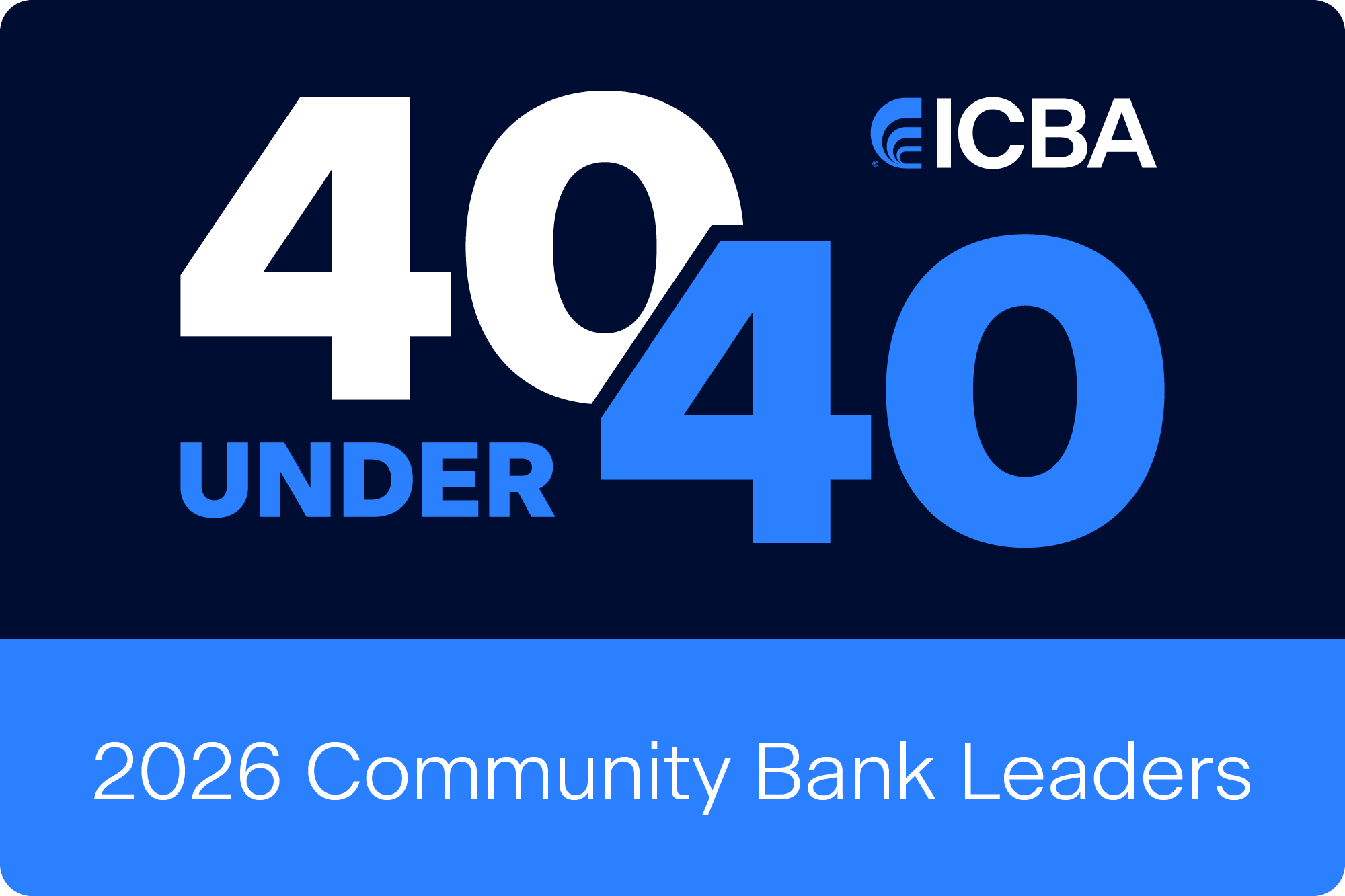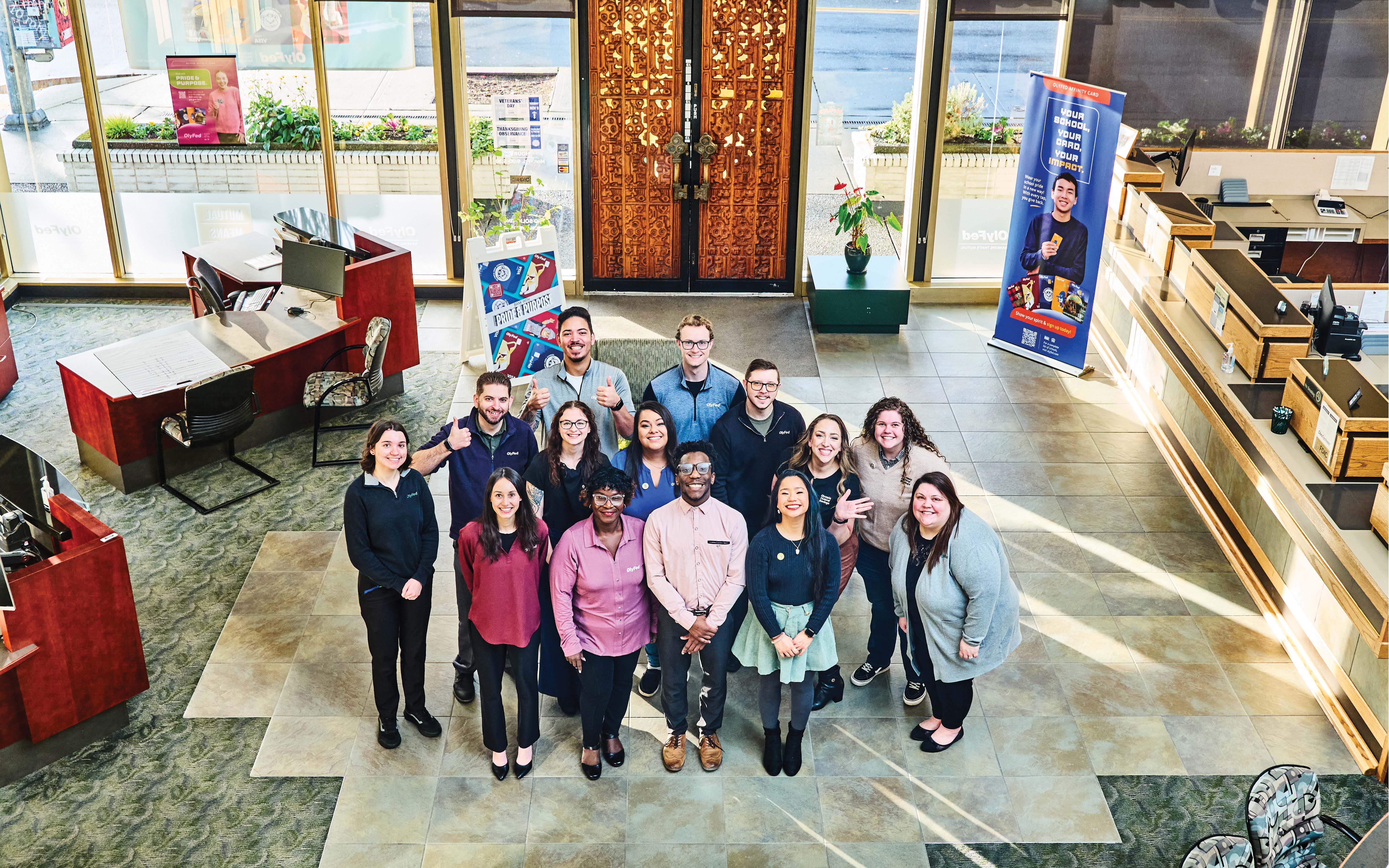The 2021/22 ICBA executive committee understands that community banks are at a turning point due to changing customer expectations and the ongoing effects of the COVID-19 pandemic. They tell us why technology and grassroots advocacy are critical to a thriving industry.
ICBA’s 2021/22 executive committee: Close the distance
April 01, 2021 / By Molly Bennett
The 2021/22 ICBA executive committee understands that community banks are at a turning point due to changing customer expectations and the ongoing effects of the COVID-19 pandemic. They tell us why technology and grassroots advocacy are critical to a thriving industry.
This year’s ICBA executive committee is being convened during one of the most challenging periods in living memory. Not only have all community banks been forced to overhaul their own operations; they’ve had to do it while helping customers navigate the complexities of life during COVID-19.
Community banks now find themselves at an inflection point. The challenge now is to anticipate and stay ahead of the permanent changes the pandemic will make to the banking landscape. While the remote services some banks fast-tracked to meet customers’ needs will stand them in good stead as product and service expectations evolve, there’s more to do.

The 2021/22 executive committee members are ready to help the nation’s community banks continue to rise to this challenge—and they’ll do it through advocacy, innovation and education.
“As we lead this industry and association forward, we know there will be challenges,” says Rebeca Romero Rainey, ICBA president and CEO. “But with this group of passionate, engaged and creative leaders, I know we will conquer those challenges with a spirit of optimism that will ensure we create and promote an environment where community banks flourish.”
The pandemic demonstrated that we could meet our customers’ needs where they are, on their own time. I think we as an industry must continue to move that ball forward by offering as many digital services as possible.—Brad Bolton, president, CEO and senior lender of Community Spirit Bank, Red Bay, Ala.

The COVID-19 pandemic has changed customers’ expectations with regard to remote access to services. How do you think community banks are and should be working to meet those expectations?
Bob Fisher: Most banks today have all the basics like ATMs, mobile banking, online banking and mobile check deposit. But we now need to take it a step further and make sure to have that functionality and look to integrate the entire experience. Every experience a customer has with their bank should look and feel the same no matter what channel they are using. Also, community banks need to look for ways to provide high-touch service along with the high tech. Our call center, for example, is 100% person-to-person interactions. Every customer who calls speaks to a live person, an employee of the bank. Although we started this years ago, it is more important now than ever during the pandemic that when our customers call for help, there isn’t a machine telling them to press 1, etc.

Brad Bolton: The expectation of our customers is to be “always on” while retaining our relationship-focused manner of doing business. The pandemic demonstrated that we could meet our customers’ needs where they are, on their own time. I think we as an industry must continue to move that ball forward by offering as many digital services as possible. Community bankers must stay vigilant in meeting customers’ expectations. We can do it, and I am confident that ICBA’s innovation focus will help community banks meet the challenges ahead.
Russell Laffitte: Our customers expect instant access to their financial products and needs. Community banks have been investing in digital solutions to take care of their customers during and before the pandemic. Some may have more work to do than others, but with fintechs we continue to stay competitive by offering the best customer solutions.


Greg Deckard: As chairman of ICBA Bancard, I am aware of the tremendous team and resources ICBA and our Services Network provide to community banks. Recently, I wrote an article regarding this very issue: providing access to digital offerings, payment strategies (not just debit and credit cards) and staying abreast of fintech developments. Our clients demand we provide a vast array of technology offerings, especially during the pandemic. We have seen tremendous growth in enrollment and usage of our offerings and anticipate this trend to continue.
Tim Aiken: I think a lot of us adapted rather quickly to this new normal. In some cases, it moved up timelines for products and services or upgrades that banks were already considering. I also have to give credit to the many vendor partners who met this challenge as well.


Noah Wilcox: I think community bankers have done a terrific job adapting to the changing customer expectations. However, they will have to continue to adapt to those customers’ changing preferences and expectations. Bankers would be well advised to embrace creativity as they seek to maintain that relationship component of their business model.
Preston Kennedy: Community banks that are not working overtime to improve remote access need to consider how that will significantly impact business in the years ahead. When the pandemic is over, and community banks can once again resume our renowned personal service, those that have invested time and money into digital platforms will be unstoppable in their markets.

Tim Zimmerman: Consumers found out they can very effectively access core banking services electronically. In fact, consumers now expect even more convenience and easy access to products, services and advice. The use of everything from mobile check deposits to online account opening has become commonplace. Direct electronic payments and meeting with customers by video, which were cutting-edge just a year ago, are now used every day. We have changed to meet our customers’ needs.
Jack Hartings: ICBA’s ThinkTECH Accelerator is an excellent program. The pandemic may have made ThinkTECH even better, because we’ve taken the one-day onsite banker visit with the fintechs and gone virtual, allowing banks to more easily attend the program and to include multiple members of their staff. ICBA’s ThinkTECH is a must for those community banks that want to meet their customers’ experience expectations in the digital world.


With the White House and Congress having changed hands, which issues do you see as having the most potential in terms of community bank advocacy?
Fisher: I believe one of the issues that could be resolved quickly with the Biden administration is cannabis banking. There has been bipartisan support in the past, but I could see this issue getting traction as more states look to legalize cannabis to help solve their current budget deficits. This would finally provide a clear path for both the banking and cannabis industries. We also need to continue to advocate for a regulatory framework tailored to risk and business models. There is also a need to advocate for big banks to be held accountable when they make business decisions that do not adhere to regulations and laws. There is currently unequal justice as it pertains to adherence to regulations and laws.
I believe we will see the largest gains in the cannabis debate and support of minority-owned depository institutions, but we will have opportunities with many other issues that will come down the pipeline in the next year.—Russell L. Laffitte, CEO, Palmetto State Bank, Hampton, S.C.
Bolton: We have an excellent opportunity to continue to differentiate our business model due to our historic, and unmatched, response to the pandemic and the Paycheck Protection Program (PPP). We can play offense and defense with our relationship-driven model of community banking. No matter who is in control of the White House and Congress, the politics of community banking will remain our primary focus. We can easily prove the community banking industry is not a threat to consumers.

Laffitte: Opportunities are always present with advocacy. With the change in Congress and so many new people in Congress this year, we will have the opportunity to teach so many about the differences between community banking and the credit unions and big banks. I believe we will see the largest gains in the cannabis debate and support of minority-owned depository institutions, but we will have opportunities with many other issues that will come down the pipeline in the next year.
Deckard: ICBA has a good opportunity to capitalize on our lobbying over the years during this Congress, particularly in passing the Safe Banking Act. We were able to get the legislation passed out of the House Financial Services Committee, and I am hopeful that we will see the Senate pass the bill and have the president sign it into law. The Treasury Department and Small Business Administration relied upon ICBA’s expertise and feedback to make needed changes to the PPP program. Our team was effective in communicating the challenges of this massive new package, and I think we can continue to convey our suggestions to smooth the processes of loan approval and loan forgiveness.


Aiken: I see huge opportunity for small business lending. Community banks really stepped up during the COVID crisis, and that is evident for all to see. It should be obvious to policy makers that the key to getting our economy back on track is to allow community banks to do our thing. Cybersecurity is another big issue, especially in terms of applying equal safeguards to third-party data aggregators. That also is something that seems to have bipartisan support.
Wilcox: There will be opportunities to advance our pro-community banking agenda. However, it will be highly likely that we will play defense as well. Both of these fronts will require strong grassroots advocacy for us to be the most successful.
Kennedy: There are lots of new faces, and old faces in new places, so it is vital to establish lines of communication with the new Congress and administration. ICBA will lead efforts to communicate the issues that are important to community banks.


Zimmerman: The issues we are advocating are not dependent on which of the parties is in the majority. ICBA has always worked in a bipartisan way, so we will continue to do that. We will identify which issues have the best chance to be acted on and proceed accordingly.
Hartings: First, I think it’s essential that we don’t see the legislative gains we have achieved the past few years evaporate. I believe we may have an opportunity in the next 12 months to get some relief on cannabis banking issues with a safe harbor, and we may see the SAFE Act or something similar get passed. I would also hope that we can finally get the ILC loophole closed and eliminate corporate shadow banking. You never know what issue might be next; no one had heard of PPP at 2020’s ICBA LIVE.
Advocacy is critical for community banks. While we may continue to see some headwinds, the more we are engaged, the greater the likelihood that we can prevail.—Bob Fisher, chairman, president and CEO of Tioga State Bank, Spencer, N.Y.

How and why did you get involved in grassroots advocacy?
Fisher: As a fifth-generation community banker, I’ve been involved with grassroots advocacy for what seems like my entire life. Our bank was one of the first banks to sue CUNA over share drafts and paying interest on checking accounts back in the mid-1970s. I’ve been traveling to Albany, N.Y., and Washington D.C. throughout my entire career to fight for what is right for our industry. Advocacy is critical for community banks. While we may continue to see some headwinds, the more we are engaged, the greater the likelihood that we can prevail. I truly enjoy advocacy, and it is what first attracted me to ICBA. ICBA is clearly focused on who it represents, which is also important to me.
Bolton: I learned advocacy from my father, Billy Bolton, as well as being encouraged to become involved by some strong Alabama community bankers. During the great recession of 2008, I saw firsthand how government overreach can negatively affect the way we can serve our customers. It was also clear then, and now, why it is so important for community banks to have their own unique voice speaking on our behalf, and that is only done via ICBA. In sum, I advocate because I am dedicated to the unique and exclusive message that is community banking. Grassroots advocacy is necessary because we matter to Main Street and the customers we serve. I am unashamedly, and without hesitation, proud to be a community banker.

Laffitte: I became involved heavily in the grassroots side of advocacy after going to ICBA’s Washington Policy Summit [now the Capital Summit]. After visiting with our state delegates all day, who I felt did not want to meet with us, I told our state executive that I was not coming back to Washington unless I knew my voice was being heard. It was a wake up call about how important it is to engage. I had not been back from Washington a week when Sen. Tim Scott’s (R–S.C.) office reached out to us for how we felt on an issue that was in the Senate Banking Committee, since we had just discussed this with them. I realized that at that time, they may not have seemed interested, but it does matter. They do hear us, and it is very important. Since then, I have been heavily involved in advocacy.
Deckard: Initially, my involvement began at the state level in representing community banks in the state of Washington. The Community Bankers of Washington (CBW) invited me to participate on the board of directors. I learned back then that if we don’t stand up for our industry, nobody will! My bank has been a member of ICBA for almost 40 years, and through attending conventions and visits to Capitol Hill, I became passionate about our national association. The relationships developed with legislators, administration officials, regulators and fellow bankers have been critical for my own bank and my industry.
Wilcox: We are each responsible for making our voice heard and not letting others carry our water. When community bankers join their voices together, their chorus becomes incredibly effective at advancing the pro-community bank agenda.

Aiken: The first ICBA convention I attended was in 2004 in San Diego. [Former ICBA president and CEO] Camden Fine gave a very impassioned speech about advocacy. A favorite saying of his was “If you’re not at the table, you’re on the menu.” That stuck with me.
Kennedy: About 25 years ago, my congressman had become a leading proponent for Wall Street—at the expense of his Main Street constituency. His arguments, couched in a lofty defense of the free market system, rested on the dubious premise that the Too Big to Fail problem had been solved! Community banker allies banded together, challenged his dangerous positions and effectively muted this threat to community banking.

Zimmerman: As I looked at our industry, I realized that part of the responsibility of every community banker is to be involved with advocating for our industry. Due to the huge impact both legislative and regulatory bodies have on our business, you must engage and ensure that the voice of community banking is heard and understood. That is best done on the grassroots level with real stories explaining the effects, sometimes unintended, of legislation and regulations on individual banks, customers and communities.
Hartings: I wanted to make sure, either on the local or national scene, the legislators understood my bank’s and my community’s issues. Like most bankers early in my career, I attended local political functions and went to D.C. the first time with our state association, CBAO [Community Bankers Association of Ohio]. As I went through leadership at CBAO and then ICBA, I got more involved with advocacy and support of our PACs. It just confirmed to me the need to step up and speak up for community banking.
The conversation continues in part 2.
Subscribe now
Sign up for the Independent Banker newsletter to receive twice-monthly emails about new issues and must-read content you might have missed.
Sponsored Content
Featured Webinars
Join ICBA Community
Interested in discussing this and other topics? Network with and learn from your peers with the app designed for community bankers.
Subscribe Today
Sign up for Independent Banker eNews to receive twice-monthly emails that alert you when a new issue drops and highlight must-read content you might have missed.
News Watch Today

Join the Conversation with ICBA Community
ICBA Community is an online platform led by community bankers to foster connections, collaborations, and discussions on industry news, best practices, and regulations, while promoting networking, mentorship, and member feedback to guide future initiatives.













